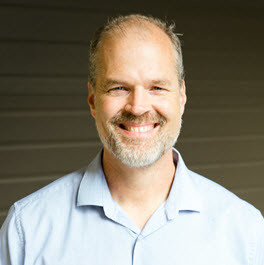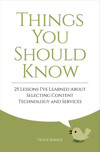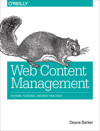
My LinkedIn Profile | How to Contact Me
Introduction
I’ve spent over 25 years working with content technology. It’s been my sole professional concern for my virtually entire career.
My experience has mainly been with content management systems (CMS), but I have experience in all the related product categories: digital asset management (DAM), content marketing platforms (CMP), digital quality management (DQM), enterprise content management (ECM), etc.
Under the umbrella of “content management,” I have extensive experience in the following:
- Content ideation and collaboration
- Content needs analysis and product selection
- Content structure analysis and modeling
- Content workflow and governance
- Content aggregation, integration, and orchestration
- Content delivery
- Content migration
My experience in professional services has included dozens (hundreds?) of CMS implementations, selections, consultations, and migrations.
Some years ago, I waxed poetic about why I’ve been so drawn to content management all this time –
A little dramatic? Maybe. But I stand by it.
Employment History: Current Positions
Director of Strategic Engagement
I have three major roles here:
- I manage the thought leadershop process in the Strategic Communicatons practice.
- I run the Customer Advisory Board for North America, which is a group of key customer who meet regularly to discuss the practice of internal comms.
- I serve as a general subject matter expert about content management. This includes a lot of customer and prospect consulting work, and working with out own internal Product team.
Employment History: Past Positions
Vice-President of Digital Experience Consulting
I was in this position for a very short period of time – just about six months. It wasn’t a great fit. The company had just acquired another firm, and there was a huge amount of change. It was a bit of a whirlwind.
The goal in hiring me was to do three things:
- Create a thought leadership practice around digital experience
- Do pre-sales support on large opportunities
- Do some limited front-line consulting (I had asked for this)
However, the business direction changed rather abruptly just after I joined. Goal #1 came off the table, which was the biggest reason I had joined the company. After six months, my boss and I just agreed that we weren’t going to be able to achieve what we had hoped for.
And throughout my time there, I came to understand that I had somewhat burned out on “digital marketing.” I loved CMS in theory, but I struggled to stay excited when confronted with marketing-heavy use cases.
(I wonder a bit if this was fair to Valtech. I went in knowing this was what the job entailed, but I didn’t realize how much I had changed as a person over the preceding years. I just can’t get excited or interested in marketing use cases for CMS anymore. I have some guilt and regret that I only realized this after a few months at Valtech.)
At the same time, I was being recruited by a longtime friend, and it was obvious that Staffbase was a much better fit.
My departure from Valtech was completely mutual and amicable. They treated me very well during the short time I was there. My (former) boss and I are still quite friendly, and we text regularly.
Instructor
I taught two courses per year at a technical university in Austria. The syllabi are open and Creative Commons licensed:
Both courses are part of the Masters of Content Strategy program. The first course is required of all students. The second course is an elective.
Pre-COVID, I traveled to Graz once a year to teach four sections over a weekend. Since COVID, this has been fully remote.
Unfortunately, my experience at this was mixed. I enjoyed teaching, but I felt like I did poorly at the assignments and evaluation work.
I ended this engagement after nine years. I began to think that I was teaching it like a developer would teach it, not as a content strategist would teach it, and I started to wonder if that was the right way to approach it.
I co-taught the courses with a good friend for two years (she is a very technical-minded content strategist), so the handoff was warm.
Global Director of Content Management
I was brought into (then) Episerver to enhance and support the CMS product line.
For the four years I was with the organization, I worked in the Product Strategy group, reporting either to the Chief Product Officer or the Vice-President of Product Strategy.
My main responsibilities were:
Thought Leadership. I did a lot of public and virtual speaking – webinars, conference presentations, etc. Also, I did some written thought leadership, though less than I wanted.
Product Strategy. I was tasked with analyzing and understanding the content technology market – things like upcoming trends, what’s hype, what’s not, and what our customers were thinking about (both what they said they wanted, and what they actually needed, which were often not the same thing). During my tenure, this regularly involved due diligence for acquisitions (we completed six of them while I was at the company).
Product Development. I did some work on developing our CMS product, but less than I wanted. Given my long history with the product, I was often a feedback and information source for product managers. Occasionally I was given the leeway to push forward on specific product initiatives. Often, I developed add-ons that are released to the public, though not as part of the “official” product.
Analyst Relations. Optimizely has an extensive analyst relations program. I did most of the analyst briefings for our content products (CMS and CMP), and handled responses for the various analyst reports (MQ, Wave, Marketspace, etc.)
Sales and Customer Success Support. I was a resource for sellers in larger CMS opportunities, and for customer success managers with customers experiencing content-related issues. This included both technical and governance/strategy issues.
Customer Advisory Board. I co-managed an ongoing focus group of customers using our content products. We met virtually and in-person to discuss their usage of the products, their needs, and our roadmap.
My job at Optimizely was not a specific one. For lack of a better term, I was a high-level utility player. My job was to promote the organization’s content products and keep an eye out for broader industry and market trends. I was assigned various projects, and I was often dropped in to troubleshoot sensitive sales and customer issues.
I left after five years (and 15 total years working with the product) because it had moved away from the CMS company I joined. It had drifted heavily into digital experience, which I wasn’t as excited about.
My role was vague, and towards the end, the Optimizely just didn’t quite know what to do with me. I was providing value (I hope…), but I didn’t have a clear, defined spot in the organization, and that felt precarious.
Partner
My years building Blend Interactive constitute the largest portion of my work experience. I spent almost 15 years at Blend.
Blend is a web development agency specializing in CMS implementations, mostly using Optimizely CMS and Umbraco. They work with mid-market customers with project budgets of $100K to $500K.
I founded Blend along with two partners. I had done web development as a side gig for years, and when a friend was laid off, we decided to try to make a go of it full-time.
I started as a developer, but then moved into a more management/strategic role as the company grew.
At the end, I was “Chief Strategy Officer.” This title meant little, but it put me in a position to handle sales and business development. We didn’t really have a marketing budget – we thrived through word-of-mouth and thought leadership. I blogged and tweeted a lot, and spoke at a lot of conferences. We developed a good reputation in the CMS implementation space.
In 2008, we aligned the company with (then) Episerver. For the decade following, we grew around Episerver’s expansion into the North American market.
Over 15 years, we grew Blend to about $3 million in revenue, and 20-some-odd employees. Year over year, we never posted a loss, and we never had to reduce staff involuntarily.
I left Blend in the fall of 2019 to join Episerver. I continued to hold an equity interest for a year, then sold my shares at the end of 2020. Blend continues to thrive today, and I’m still very friendly with my former business partners.
I’m proud of what we did with Blend, but in all honesty, I didn’t love owning a company. I enjoyed the professional autonomy it gave me, but I didn’t like the day-to-day minutia of management. (Truth: I did very little of it. Thankfully, I had a partner who was very good at it.)
Director of Marketing and IT
This was a small company, so I headed up two areas of responsibility – I handled all the IT management, and the marketing of commercial real estate properties (which was mostly digital).
I gained a lot of practical experience in IT infrastructure. It was by no means enterprise, but I designed and managed an office network, including a storage architecture. (Note that this was long before “the cloud” was the thing – in those days, we had an on-site Exchange server, RAID array, and networking gear.)
I left to start Blend, and the owner of Sioux Falls Commercial became a Blend investor until 2015. He’s a still a good friend.
Intranet Development Manager
I joined BANKFIRST (yes, it’s supposed to be in all caps for some reason…) as a web developer, but eventually managed nine people on the intranet development team for a brief period of time.
We supported and developed an organization-wide, web-based intranet. That was actually the easy part. The harder part were the organization and governance challenges in involved with balancing the intranet against every other information source in the organization. “The Intranet” was effectively every digital source of information across the enterprise, and we spent a lot of time trying (and mostly failing) to unify those.
In the wake of 9/11, BANKFIRST went through a downward spiral. I was laid off in the 6th job of job cuts. Subsequently, I was unemployed for about eight weeks, which is the only period of time I’ve been without a job in 30 years.
Analyst, Testing and Requirements
I spent 10 years at Citibank, starting there the week after I graduated high school. I worked phone center positions for eight years throughout college (and a leave of absence for the Navy), and I finished with two years in the information systems department, which was my first position in IT.
Honestly, I wasn’t great at this job. There was little training, and I was very young. However, I did learn a lot about how enterprise IT organizations functioned.
I left because I was fascinated by the web, and BANKFIRST advertised a position for an entry-level web developer.
Publications
I have written four books about CMS or related subjects.

Real World Content Modeling: A Field Guide to CMS Features and Architecture (2019) (you can read this entire book on this website)

Things You Should Know: 25 Lessons I’ve Learned About Selecting Content Technology and Services (2020) (I’m currently serializing this on LinkedIn)

The Web Project Guide: From Spark to Launch and Beyond (2021) (this is also available online)
The first was published by O’Reilly Media – it was one of their popular “animal books” (contrary to popular belief, you don’t get to pick your animal; my animal ended up being the Pygmy Flying Squirrel).
I’m told it sold several thousand copies, but O’Reilly declined to publish a second edition because “practice-centric” books don’t sell nearly as well as “platform-centric” books. (Put another way, a book about Drupal specifically will always sell better than a book about content management in general.)
The next two books were self-published through Amazon. The last book was also self-published, through a different vanity press.
I am currently planning a second edition of the O’Reilly book with a co-author. We are shopping for a new publisher (I own the copyright, and O’Reilly has agreed to relinquish their publishing rights).
Here’s an extensive list of other content-related writing.
Other Professional Experience
I’ve been a member of the Boye and Company CMS Experts Group for many years.
I’m currently completing a podcast series with the co-author of my last book. We discuss each chapter, and have an expert guest for each episode.
I started a podcast for The Content Management Bible. I keep meaning to get back to it (I enjoyed doing it, but I’m not great at the technical production aspect). I finished Part 1 of the book, which I’ll call Season 1 of the podcast. Bob Boiko is aware of (and somewhat amused by) this project.
For several years, I produced a CMS-focused email newsletter called Squirrel Notes. I’d like to restart this, but I stopped for specific reasons.
When I was at Blend, I helped organize several conferences. (The key there is helped – I didn’t do logistics, I just hosted and helped procure content.)
I’m the mod of the /r/cms/ subreddit, though it can be tough to do anything constructive with it.
I was on the final board of Content Management Professionals (we shut down the organization)
Education
I have a B.A. in Government and International Affairs with a minor in Philosophy from Augustana University in Sioux Falls. I earned the degree in 1997. (I graduated high school in 1989, but delayed college due to military service and general youthful indecision.)
I was planning to become a lawyer, hence the degree. But halfway through college, the internet broke into the mainstream. I got a computer and never really looked back.
I don’t regret my degree. There was no program back then that would have prepared me for where my career would eventually lead. I still enjoy the complex systems and analysis aspect of geopolitics. In another life, I would have moved to DC and been an analyst for the CIA or the State Department.
I spent a couple of terms on Augustana’s Alumni Council and the Computer Science Advisory Board.
Military Service
I was a hospital corpsman (a medic, essentially) in the U.S. Navy and U.S. Naval Reserve from 1989 - 1995. I spent time with the Naval Reserve Unit in Sioux Falls, and a Marine Corps Reserve Unit in Des Moines. I ended my service as a third-class petty officer (E-4).
My active duty service was mainly with the Marines, either in Camp Pendleton or Camp Lejeune (the Marines have no medical staff; they’re supported by the Navy in that respect).
During my service with the Marine Corps, I spent time at Amphibious Assault school in Coronado, California; Field Medical Service School somewhere in Wisconsin; and The School of Infantry at Camp Pendleton.
Other Organizational Experience
I was on the trustee board of Sioux Falls Seminary for a period of time, eventually becoming vice-chairman. My tenure coincided with a change in leadership, and I served as the head of the Interim Oversight Team which managed the seminary for six months between presidents.
I serve on the Property Board of Central Church. This board is responsible for all physical property, facilities, and land issues for a large church of 5,000 regular attenders.
I was the president of the Dakota Region Porsche Club of America for several terms.
Things I’m Good At
I have extensive experience with CMS and related fields. But here are some other areas I do well at:
Public Speaking. I’ve spoken at hundreds (?) of events, from small workshops to keynotes with thousands of attendees (I was the developer keynote at Sitecore Symposium in 2018, which had about 5,000 people in the room). Subjects range from motivational to promotional to technical.
Written Communication. I’ve spent most of my career writing about content technology. This includes four books, and a blog that was fairly influential at one time. I’ve essentially made a career out of explaining things, and getting people excited and interested in content platforms.
Industry Networking. I’ve come into contact with a lot of people in the content industry over the last 20 years. I’ve developed an extensive network during that time.
Consultative Selling. I like working with prospects to define their problems and brainstorm solutions. I’m pretty good at painting a picture of future potential.
Sales Enablement. I enjoy supporting sellers in opportunities. I’ve been told that I’m responsible for a lot of sold software over the years. I also enjoy training sellers.
Things I’m Not Good At
To be clear, there are a lot of things I’m not good at. (I’m trying to learn to play the drums. I’m terrible at it.)
However, here are some weak areas which my experience suggests I should be good at:
Staff Management. I’ve rarely managed staff, and I’ve never done it well. I’d like to try again at some point. However if you’re not good at it, you harm both the organization and the staff you mismanage, so I’m intimidated by it.
Software Production. I have decades of programming experience (my GitHub), and I still do quite a bit of development as a prototyping tool. However, I’m not experienced at production software delivery, and I wouldn’t perform well as a member of a development team. I don’t have the necessary attention to detail or process.
Traditional Sales. My sales experience is extensive, but atypical. At Blend, I did very consultative sales. At Optimizely, I’m brought into very particular types of sales at specific points to consult with prospects. I’ve never done traditional enterprise sales, never done proactive sales prospecting or ABM, and I’ve never been managed to a quota.
Digital Commerce. I fully understand where commerce overlaps with content – I’m perfectly capable of product management and delivery. However, I’m fairly ignorant of the transactional processes and nuance behind commerce platforms (…even though my current company sells two of them).
Digital Marketing. I understand the technology landscape of digital marketing and can speak with authority about it, but I’ve never actually practiced it. There’s a vast array of post-publish optimization tools for which my knowledge is purely academic. My empirical knowledge of CMS ends at the “Publish” button.
UX or Design. I couldn’t design my way out of a paper bag. (I mean, just look at this website…)
In addition to those specific areas, I have a some other personal shortcomings worth mentioning.
Idealism. I can be ridiculously idealistic about CMS. The business of software requires balancing product against market requirements, and I’ve never been great at this. I get frustrated with business realities sometimes, and I need someone to call me out when I get on a soapbox.
Shiny Objects. When it comes to content technology, I’m interested in all the things. I can get side-tracked easily. This is has been largely helpful in my current position (I do a lot of R&D), but I sometimes need to be pulled back to the real world.
Didactic Narcissism. As this document might suggest, I like words. I assume everyone will read every word I write and listen to every word I say. I get frustrated when circumstances don’t allow me to fully explain something, or when someone isn’t as interested in a topic as I am. I often need to be told to summarize the high points (which I will do, grudgingly). I’m constantly being told I’m “at the wrong altitude.”
General Delusions of Grandeur. Professionally speaking, my appetite is often bigger than my stomach. I think big, but I can get lost in the details. I need to be balanced by someone far more practical than myself.
Perfectionist Procrastination. I’ve been known to avoid working on projects that I consider to be “perfect.” Some things are so good, I’d just rather they exist in theory, rather than get muddled up by reality. This is a constant struggle to manage.
Topics I’m Interested In, Professionally
Clearly, CMS and other content technologies are my core area of professional concern, but there are related areas about which I’m particularly curious.
Editorial Scripting.I’ve investigated and prototyped several different options for allowing editors some level of programmatic control over their digital content. (See this blog post, or this library, or this talk.)
Distributed CMS.I’ve been talking about this for a long time. I think the future of CMS is…post-modern? The future of content is more about aggregation and homogenization, and less about monolithic repositories. (See this blog post from 13 years ago.) I love the idea of non-traditional (read: weird) content repositories being used to power content delivery architectures. (I just started playing with Notion and I’m sorely tempted to build a CMS out of it.)
Lightweight Markup Languages.I’ve worked with and extended Markdown extensively, but I’m more generally interested in the process of codifying content intention in text. Particularly, where are the intersections between IA, design systems, and LMLs? And beyond simple text formatting, where is the overlap between an LML and a full markup language. (I’ve done quite a bit of tinkering in this space for this website.)
Digital Quality Management.I’m curious how organizations can maintain content quality when their digital estates stretch into tens of thousands of content objects spread across hundreds of authors. How can you maintain consistency and quality at that scale? (To this end, I built a home-grown DQM system for this site. You can see the results of the last run. The active tests are listed at the bottom of that report.)
Creative Collaboration.What systems and processes allow teams to do their best work together? How do you balance human creativity and technological tools?
Intranets.These were my favorite projects when I was at Blend. I’m fascinated at the IA involved in organizational information distribution (see this blog post and this one).
Intellipedia and Diplopedia.The IC and the State Department both use MediaWiki for knowledge management. I’ve everything read that’s publicly available about these installations. As I mentioned above, I would have loved to work for either of these organizations, and I’m fascinated by their usage of content management in general, and bottom-up information aggregation specifically.
Business Fiction.This is rarely done well, but I enjoy Patrick Lencioni’s books, and Bob Boiko’s one attempt at it. I’d like to try this as a teaching tool. (I still watch this 30-year-old infomercial a couple times a year.)
Topics I’m Interested In, Personally
I read a lot – 1-2 books a week, on average. (Here’s a list.)
Spy Novels and Movies. I’ve been a James Bond fan since I was a teen (and something related to 007 was the first digital content project I worked on). I’ll drop everything to watch a Jason Bourne movie.
General History. I’ve been very into World War 1 lately. I find the Cold War interesting as well, having lived through the tail end of it. (Related to this, I have an interest in content modeling historical timelines – see this question at Stack Exchange for more details.)
Interactive Fiction. I’m slowly trying to collect the Choose Your Own Adventure novels of my youth (very slowly; they’re harder to find than you’d think), and I have some interest in digital platforms like Twine. (I just recently learned about ergodic fiction, which I’d like to spend some time looking into.)
Infrastructure. I’m fascinated by the background things we take for granted – communication networks, power grids, roads, etc. My wife and I went on a cruise, and the only excursion I took was to pay $130 to tour the engine room of the ship.
Complex Systems, Models, and Emergence. How do individual actors coordinate efforts to create larger systems? How do complex systems stay in balance? What models predict the organic growth of a complex system?
I’m curious to a fault. I keep track of everything I look up.
Family, Location, and Other Activities

At my son’s wedding in June 2023. From left: Gabrielle, Isabella, Taylor, Alec, me, and my wife, Annie
I have been married to Annie for 25 years. My wife is the head kindergarten teacher at our church.
We have three children – my stepson Alec is 30 (married to Taylor), and we have two daughters: Gabrielle, 23; and Isabella, 21. Our son is an accountant who lives in Tennessee with his wife (she’s in a medical residency there). They gave us our first grandchild: Sutton, born November 2024.
Our older daughter is a registered nurse, working in the local NICU. Our younger daughter is finishing up nursing school. (So, we have an “empty-ish” nest – the girls are independent and have lives of their own, but they’re not completely launched yet.)
Annie and I have a dog and two cats (either daughter would steal the pets if they thought they could get away with it).
I’m a New Zealander by birth. I immigrated when I was six-years-old, and became a U.S. citizen in 2009.
I’ve lived in Sioux Falls, South Dakota since I was a teenager. (I’ve lived in the same house for 25 years, in fact.)
I’ve been doing CrossFit for 13 years. I’m a Level 1 certified trainer, and I coach part-time classes at my local gym. (I’ve written quite a bit about CrossFit.)
My wife and I are both active at our church. I volunteered in the youth ministry for about a decade, and I serve on the Property Board.
I am awful at home improvement projects. Every project I attempt ends with me telling the story to my therapist.
The Bottom Line…
…is that there isn’t one.
Everyone loves binary thinking – we like it when someone or something is all black or all white. That makes it easy to accept or reject it. (As usual, The Onion nailed it…)
But people exist in shades of gray.
I know a lot about a narrow area of study. I’m pretty well-known among a small group of people. And I’m good at many things. But I’m bad at (at least) an equal number of things.
Throughout my career, I’ve failed a lot (read this sometime), but the projects I’ve worked on are complicated and murky. Some of them were doomed from the start (no one calls me in to help on an easy problem…), and others had poorly-defined success criteria (the prototypical wicked problem). In my history, there are a great number of projects I probably should have never taken on.
But I think I’ve succeeded more than I’ve failed, and I’ve created more value than I’ve cost. And if I had stuck to simpler, more repeatable projects, I probably would have done better.
I keep trying to get better. And I keep looking for the perfect problem to solve.
Someday I’ll find that and solve it, and then I’ll retire.
